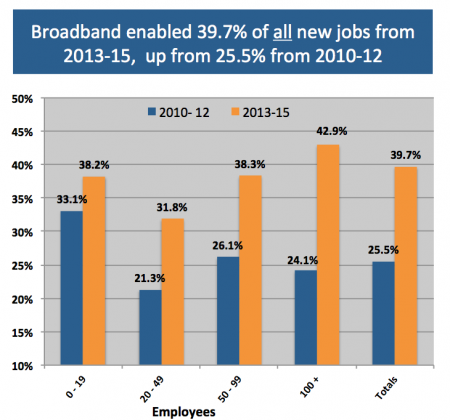Local economic development through broadband is about much more than technology
 (Read the entire article by Gary Dunmore here)
(Read the entire article by Gary Dunmore here)
Today, most people and businesses are computer literate, and aware of the Internet’s potential – at least in general terms: about 70% of households have a computer at home with some form of Internet access (increasingly broadband), many others have access to computers and the Internet at other locations (such as the workplace or school) and virtually every business uses computers and over 85% have Internet access. Many households and businesses don’t “use” broadband mostly because it is not available in their area. However that’s changing fast – as private and public investments help make broadband increasingly more available and adoption more straightforward. The proof: current research shows that US household broadband adoption increased from 55% to 63% in the past year, while dial-up Internet use dropped from 10% to 7% over the same period.
But this also means that up to 30% of households remain “unconnected” to the Internet – for a variety of reasons, including uncertain relevance, affordability, and availability. And, while connected to a greater degree, many small businesses face the same issues when it comes to broadband adoption.
What it is missing?
For many, it is a complicated matter: firstly understanding what broadband can do for them, and then understanding that it is worth doing, and finally understanding how to make it happen. Increasing the understanding of broadband relevance contributes to the adoption of broadband by new users and increases the “benefits” of broadband by those that have it.
But the truth is that sustainable broadband adoption requires more than simply making broadband available. We can call it a virtuous circle of sort: the way households and businesses use broadband – in ways that are relevant and beneficial to them – creates broadband value. This value increases not only the sustainability of network investments through increased revenues, but also increases the social and economic benefits for households, businesses and communities. The key is education and support: meaningful support at the local level (to educate and facilitate on how to get the most out of broadband) is essential to for the full value of broadband to be realized. Businesses themselves, especially SMEs (small and medium enterprises), recognize their need for support in a number of areas: understanding broadband and e-solutions benefits, assessing and selecting relevant e-solutions, and implementing and maintaining e-solutions. Over 70% of SMEs do not have the time or resources themselves and 65% would seek external support. However, 63% say that the lack of local external resources is a critical or challenging barrier for progress in adopting e-solutions.
Key role for communities
Intermediary organizations, such as community groups, economic development organizations, chambers of commerce, etc., can play a key role in reaching out to the community of broadband users. The fact is that communities that take an active role in building capacity locally to support broadband users achieve higher impacts from broadband availability. Local support must be driven by an understanding of the fact that what is good for business growth and retention is good for the local economy, and that adoption of e-solutions contributes to business success in a global economy. Whichever organizations play this role, local economic development needs to be the driver. For households, which are contributors to the local workforce, broadband offers new opportunities for education, skills development, employment, and home businesses. For businesses, broadband offers the means to transform their operations and open new business opportunities.
Broadband support 101
Business support can be provided in a number of ways, including: access to useful information resources and tools; workshops and seminars; and local collaborative approaches to sharing experiences and best practices on what is possible and how to stimulate innovation. Success breeds success, and contributes to a positive business environment. Households and individuals can also benefit from local outreach and awareness, including training at various levels through schools, libraries, and community access centers.
Measurable results
Measurable results Not only can these support activities benefit broadband users and encourage sustainable adoption, but they help retain direct investment in broadband initiatives within the community through public and private support services. Building local capacity for broadband creates direct local opportunities for youth and re-employment. Sustainable broadband adoption and the benefits this brings require investment in “people infrastructure” as well as technology infrastructure.
By Gary Dunmore, SNG



